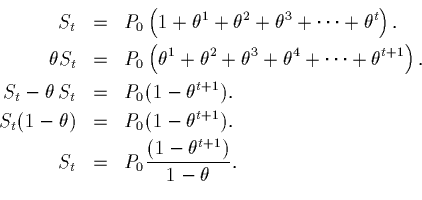



Always check this sort of formula with an example calculation:
Take P0 = 1,
![]() and t = 3.
and t = 3.
Then

Recall the formula for the sum of the first t+1 terms is

What about the limit of this series as
![]() ?
?
Answer is that it depends on the magnitude of ![]() ,
converges
for
,
converges
for
![]() .
.